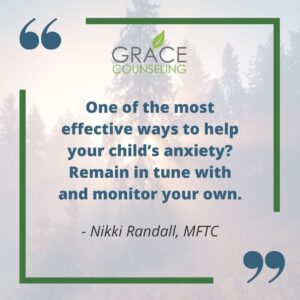If you’re the parent of an anxious adolescent child, I imagine you would do just about anything to wave a magic wand and cure your child of all their stress and panic. While I too wish there was an easy cure for anxiety, there are typically many layers to why a child may suffer from anxiety. And while a parent’s desire to fix their child’s anxiety is completely understandable and often rooted in deep love, I typically nudge parents in a different direction when they ask how they can support their anxious teenager. One of the most effective ways to help your child’s anxiety? Remain in tune with and monitor your own.
Sometimes we look at our kids and wonder “why are they acting this way?” And while there are a plethora of reasons why your child may be struggling (the stress of virtual classes, conflict going on with their friends, an unrequited love interest at school, etc…) many times children can be a reflection of what’s going on with their parents. This is in no way a jab at your parenting. As family units, we are deeply connected and can often reflect one another’s emotions in our own actions. This can especially be true if your child is an empath, meaning your child has an intrinsic gift of empathy and tends to carry the emotions of those around them. Perhaps you’ve noticed your adolescent child do this with their friends or their siblings. Their friend is sad, so they feel sad. It’s something to take note of, as they likely will do the same with you (their parent). This can be a beautiful, loving part of your child’s personality, however it is something to monitor. It is always the responsibility of a parent to regulate their own emotions – so ideally a child can learn to do the same for themselves.
Now, if your child is anxious this does not mean it is your fault. It also doesn’t mean you have to get better in order for them to get better – that would be codependency. We know that in any healthy relationship, each person is responsible for their own emotions. At the end of the day, it will be your teenager’s choice whether or not they want to put in the hard work of learning how to manage their own anxiety. Yet, there is a clear dynamic that I often see in my office that is difficult to deny – when parents are anxious, their kids tend to be anxious. And the reverse is often true as well: When parents begin to effectively manage their anxiety, their children often follow suit. This ultimately points to a fundamental truth of all relationships; part of being in relationship with someone means to be affected to some extent by that person’s emotional state. We have likely all experienced how our bodies react when we are around a calm, grounded person versus when we are around someone who is highly tense or is in crisis mode – even if that’s a simple interaction with a cashier at the store. How much more is this true for family members who live day-to-day life together? Your child’s anxiety is not your fault and your child is impacted by how you handle your own anxiety. Both of these statements can be true.
Parents – your anxiety/stress is so valid. Especially after a year like 2020. When you make your mental health and your own anxiety-management a priority, you’re embodying to your child that:
1) Everyone has emotions and it’s okay to struggle
2) In this family we value mental health
3) It’s possible to gain control over your anxiety
The question then is HOW – how can parents stay in tune with and monitor their own stress and anxiety? Parents already have so much on their plate. “Manage my stress!” can feel like another thing to add to the to-do list. For some practical tips on managing your anxiety, see my blog post here. Or if you’d like a listening ear and some support, you can call our office at 720-489-8555 to find a counselor that can help.
Nikki Randall, M.A., MFTC is a Marriage and Family Therapist Candidate who enjoys working with teens and adults to manage and reduce anxiety. Contact her or the front desk to request an appointment!









Figuring out how to play scatter? It’s easier than you think! Check out how to play scatter for some helpful guides and start raking in those wins!
Banca 30, eh? Might give it a shot. Heard some good things. I am going to register right now at banca 30!
Was wondering about jljl77 legit and I gotta say, it seems on the up and up. Spent some time checking it out and didn’t see any red flags. Worth a look if you’re being cautious. jljl77 legit